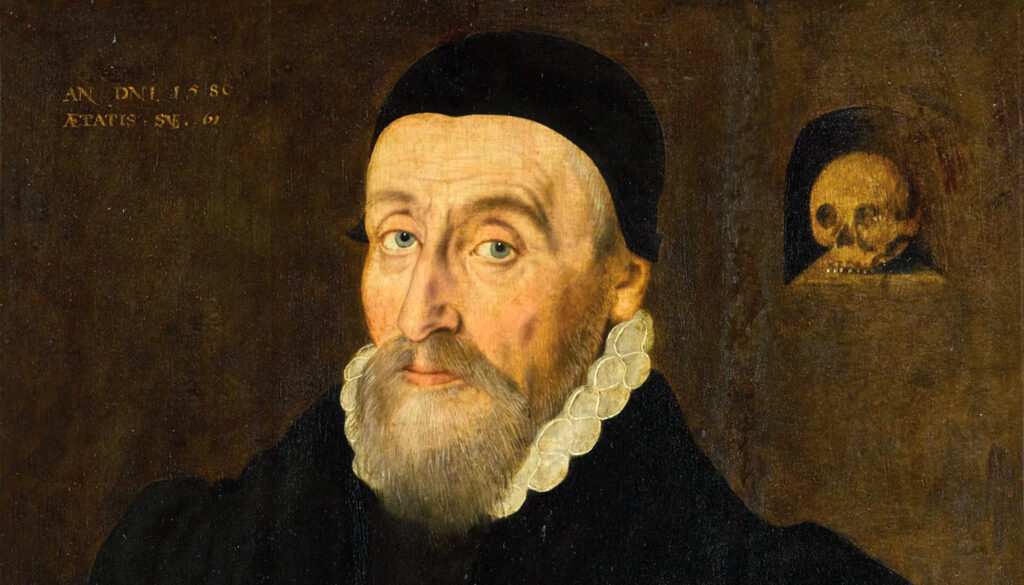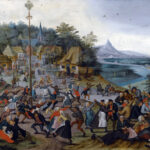29 August 1570: On arriving in Yorkshire, Archbishop Grindal declares war on bloody-minded folk-Catholicism

Detail of a portrait of Edmund Grindal ([English school] 1580).
John Strype. 1821. The History of the Life and Acts of the Most Reverend Father in God, Edmund Grindal, Vol. 1. Oxford: Clarendon Press. Get it:
.Unedited excerpt
If an excerpt is used in the book, it will be shorter, edited and, where applicable, translated.
[Grindal]’s first going down to York was not before the month of August [1570]; the 17th day whereof he came to Cawood, a seat of the Archbishops of York, where he was delivered from his late distemper: but he feared the air of that place, being very moist and gross, as he wrote in a letter to the Secretary. Nor did he much like Bishopsthorp, the other house nearer York, which was reported to him to be an extreme cold house for winter. Yet because he would be near York, to deal in matters of commission, he purposed to remove thither at Michaelmas. He was not received with such concourse of gentlemen at his first coming into the shire, as he hoped for. Sir Thomas Gargrave, with his son, Mr. Bunnie, Mr. Watterton, one of the Savyls, and four or five gentlemen more, met him near to Doncaster, and conducted him unto the said Sir Thomas’s house, where he lodged that night; and the next day met him at his church Mr. Ask, Mr. Hungate, and four or five more inferior gentlemen, and brought him to Cawood. But several came to him soon after, excusing themselves either by their own sickness, or of some of their families; as Sir William Babthorp, Mr. Slingesby, Mr. Goodrick, Mr. Beckwith, and some others: for indeed agues were at that time very universal throughout all that country. Sir Henry Gates was then with the Lord Lieutenant in the north, but came to the Archbishop upon his return.
In what condition he found the people of these parts at his first coming among them, take his own account in his own words, in his letter wrote to the Secretary, August 29:
I cannot as yet write of the state of this country, as of mine own knowledge; but I am informed that the greatest part of our gentlemen are not well affected to godly religion, and that among the people there are many remnants of the old.
They keep holydays and fasts abrogated: they offer money, eggs, etc. at the burial of their dead: they pray beads, etc. so as this seems to be as it were another church, rather than a member of the rest. And for the little experience I have of this people, methinks I see in them three evil qualities; which are, great ignorance, much dullness to conceive better instruction, and great stiffness to retain their wonted errors. I will labour as much as I can to cure every of these, committing the success to God. I forbear to write unto her Majesty of these matters, till I may write upon better knowledge. In the mean time I shall not cease in my daily prayers to commend her Majesty to Almighty God. God keep you. From Cawood this 29th August, 1570.
Yours in Christ,
Edm. Ebor.
By postscript he took occasion to mention some others of the gentry that came to him that day to dinner, namely, Mr. Layton, Mr. Thomas Gowre, Mr. Place, with one Mr. Davel, who dwelt far off, and came only to welcome him: concerning which last he wished there were many such.
Comment
Comment
Are the money and eggs grave goods?
As only the second Archbishop of Canterbury and York, Grindal seems to have acquired his fair share of myths, and none more ridiculous than the following fable by one William Knipe, which has him stabbed in York Minster prior to his arrival in Yorkshire alongside the non-existent Abbot of the dissolved St. Mary’s Abbey by Thomas Wilson aka Mountain, of whom, and of whose remarkable escape attempt and hanging, no other record exists:
July 30th, A.D. 1570.–At Peter’s Prison, York, in the Hall of Pleas, Thomas Wilson, alias Mountain, was tried on an indictment, wherein he was charged with having been guilty of the wilful murder of George de Walton, Abbot of St. Mary’s, on the 13th day of July, 1570, in the Cathedral Church of St. Peter’s, York; also charged for that he on the said 13th day of July, did feloniously stab the Right Reverend Father in God, Edmund Grindall, Lord Archbishop of York, with intent to do him some grievous bodily harm, in the said Cathedral Church of St. Peter, York. He was found guilty after a trial which lasted four days, and ordered to be executed on the 18th of August following. On Monday morning, being the day fixed for the execution of the said Thomas Wilson, alias Mountain, he was taken from the dungeon of Peter’s Prison, at eight o’clock in the morning, to the gallows of the Abbey of St. Mary, Clifton. Since his confinement, he had several times attempted to break the prison, and, after his condemnation, he made a hole through a brick-and-a-half partition, large enough for him to pass into the chapel gallery, from which he astonishingly ascended into another ten feet above, with fetters weighing nearly fifty pounds, and so formed as not to permit one foot to step six inches before the other. Here he broke through a plaster partition, and thus got over the brick ceiling of all the cells, and immediately under the roof of all the building, where he was overheard and soon secured. On searching him, a hooked nail and a bit of tin plate were found. The bit of plate he had whetted to a very keen edge, as a knife, to cut up the stout canvas cover of his bed into long strips. These he had twisted and strongly tied together, so as to form a very stout rope, nearly forty feet long, whereby be intended to make his descent from the roof into the surrounding yard. He was afterwards confined in a dungeon on the ground floor, and so chained that he could not reach any of the walls, and a guard was constantly kept with him. Since then his conduct had been a mixture of rage and disappointment, very unbecoming his situation. He was brought under the gallows at nine o’clock in the morning, where he spent some time in addressing the crowd, after which he twice called out, “God save the Queen,” threw aside his book, and was launched into eternity. After the execution his body was hung in chains on Clifton Ings (Knipe 1867).
Something to say? Get in touch
Similar
 26 December 1570: Edmund Grindal, Puritan archbishop of York, orders the removal of rood-lofts (and their superstitious images), and the erection of pulpits
26 December 1570: Edmund Grindal, Puritan archbishop of York, orders the removal of rood-lofts (and their superstitious images), and the erection of pulpits 27 July 1612: Jennet Preston, the only Yorkshirewoman among the Pendle witches, is found guilty at York of the murder of Thomas Lister of Westby Hall, Gisburn (Ribble Valley)
27 July 1612: Jennet Preston, the only Yorkshirewoman among the Pendle witches, is found guilty at York of the murder of Thomas Lister of Westby Hall, Gisburn (Ribble Valley)
Comment
Comment
Other sources say Lady Day – 25 March – but I’m accepting this one for the moment.
Her final days and execution are described by Mush here:
She was in dying one quarter of an hour. A sharp stone, as much as a man’s fist, put under her back; upon her was laid to the quantity of seven or eight hundred weight at the least, which, breaking her ribs, caused them to burst forth of the skin… This was at nine of the clock, and she continued in the press until three at afternoon. Her hat before she died she sent to her husband, in sign of her loving duty to him as to her head. Her hose and shoes to her eldest daughter, Anne, about twelve years old, signifying that she should serve God and follow her steps of virtue.
Peter Lake and Michael Questier’s reëxamination of the affair is very good, starting with the preface to the 2nd edition:
For various reasons, the authors of this volume decided back in the early 1990s that it was worth writing an article about the ‘pearl of York’, Margaret Clitherow, even though their opinions about the topic of Mrs Clitherow, and indeed the entire subject of post-Reformation religion, were at many points frankly incompatible (Lake 2019).
Something to say? Get in touch
Search
Donate
Music & books
Place-People-Play: Childcare (and the Kazookestra) on the Headingley/Weetwood borders next to Meanwood Park.
Music from and about Yorkshire by Leeds's Singing Organ-Grinder.




 Bluesky
Bluesky Extwitter
Extwitter